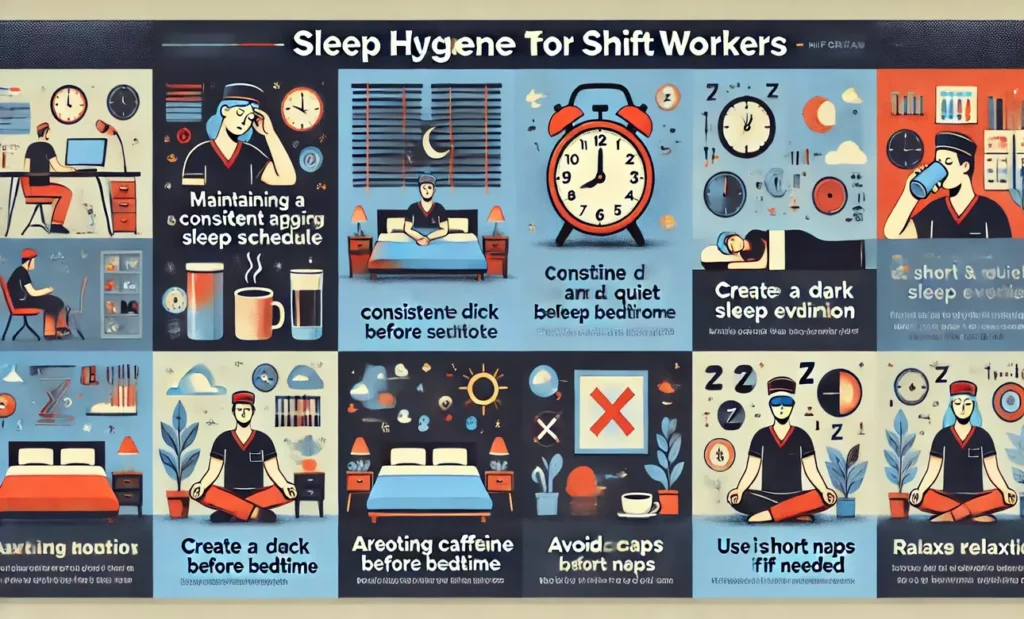Sleep Hygiene Tips for Shift Workers

Working shifts can wreak havoc on your sleep. Shift workers often struggle with maintaining a regular sleep schedule, leading to fatigue and other health issues. Proper sleep hygiene is crucial to help mitigate these challenges and ensure you remain healthy and effective at work. In this article you will discover effective sleep hygiene tips for shift workers and learn how to improve your sleep quality and manage fatigue with practical advice and expert recommendations.
Understanding Shift Work Sleep Disorder (SWSD)
SWSD is a disorder that affects people who frequently work rotating shifts or nighttime schedules. Common symptoms include extreme drowsiness, trouble sleeping, and problems with concentration. This disorder can significantly impact your overall health and job performance, making it essential to address and manage effectively.
Establishing a Consistent Sleep Schedule
Consistency is key to maintaining good sleep hygiene, especially for shift workers. To maintain a consistent sleep routine, aim to go to bed and wake up at the same time every day, even during your days off. This regularity helps your body maintain a stable circadian rhythm, which regulates sleep-wake cycles and can improve overall sleep quality.
To create an effective sleep routine, incorporate relaxing activities into your pre-bedtime schedule. Engage in soothing activities such as reading, listening to peaceful music, or taking a warm bath. Engaging in these activities can cue your body that it’s time to relax, helping you fall asleep more easily. Avoid stimulating activities, screens, and bright lights before bed, as these can interfere with your ability to fall asleep.
Creating a consistent sleep schedule may require some trial and error to find what works best for you, but it is essential for improving sleep quality and overall health.
Creating a Sleep-Conducive Environment
The quality of your rest is greatly influenced by your sleep environment. To create a conducive sleep setting:
- Keep your bedroom dark, quiet, and cool.
- Use blackout curtains to block out sunlight, ensuring the room remains dark even during daytime sleep.
- For noise control, consider earplugs or white noise machines, which can drown out disruptive sounds and create a peaceful ambiance.
Another important factor affecting sleep quality is the temperature of your environment. Aim to keep your bedroom cool, ideally between 60-67°F (15-19°C), as a cooler environment can promote deeper sleep. Ensure your mattress and pillows are comfortable and supportive, tailored to your personal preferences. An uncomfortable bed can lead to frequent awakenings and poor sleep quality.
Additionally, declutter your bedroom and reserve it solely for sleep and relaxation. This mental connection can cue your body that it’s time to relax and rest, improving your overall sleep experience.
Managing Light Exposure
Being exposed to natural light throughout the day aids in regulating your internal body clock. After a night shift, wearing sunglasses can prevent sunlight from signaling your brain that it’s time to wake up, aiding your transition to sleep. Use blackout curtains to create a night-like environment in your bedroom.
Mind Your Diet: Caffeine and Alcohol Intake
Caffeine can stay in your system for up to eight hours, so avoid it several hours before your planned sleep time. Although alcohol might help you fall asleep at first, it interferes with your sleep cycle and reduces sleep quality. Limiting these substances can improve your overall sleep quality.
The Role of Naps in Shift Work
Naps can be a valuable tool for shift workers when used wisely. A brief 20-minute power nap can greatly enhance alertness and performance without leading to grogginess. This brief nap helps enhance cognitive function and reaction times, making it easier to tackle tasks effectively during your shift.
However, it’s important to avoid long naps or napping too close to your main sleep period. Long naps can lead to sleep inertia, a state of grogginess and disorientation that occurs when waking from deep sleep. This can make it harder to return to full alertness and can negatively impact your performance. Additionally, napping too close to your main sleep period can interfere with your ability to fall asleep at night, disrupting your overall sleep schedule.
Strategically timing naps and keeping them short ensures you gain the therapeutic benefits without the drawbacks, helping maintain overall sleep quality and daytime alertness.
Physical Activity and Sleep
Regular physical activity is a powerful promoter of better sleep. Stabilizing your sleep patterns and improving the overall quality of your rest can be achieved through regular physical activity. It’s essential to schedule your workouts at the right time. Aim to finish exercising at least a few hours before bedtime to prevent spiking your energy levels, which can make it difficult to fall asleep. Vigorous activities such as running or high-intensity interval training (HIIT) should be scheduled earlier in the day.
Light exercises like stretching or yoga can be particularly beneficial as part of your wind-down routine. These activities promote relaxation and can help ease the transition into sleep. Yoga, for example, combines physical postures with breathing exercises, which can reduce stress and prepare your mind and body for rest. Stretching can relieve muscle tension accumulated during the day, promoting a more comfortable sleep experience. Incorporating regular physical activity into your daily schedule can improve both the length and quality of your sleep.
Relaxation Techniques for Better Sleep
Including relaxation techniques in your daily routine can greatly enhance your ability to ease into sleep mode. Techniques such as deep breathing exercises help calm the nervous system by lowering heart rate and reducing stress. Progressive muscle relaxation consists of tightening and gradually releasing each muscle group, helping to alleviate physical tension. Mindfulness meditation focuses on staying present and reducing mental clutter, helping prepare your mind and body for rest. These practices can create a soothing pre-sleep routine, promoting a more restful and rejuvenating sleep experience. By regularly engaging in these activities, you can enhance both sleep quality and overall well-being.
Using Sleep Aids Wisely
If natural methods are insufficient, consider using sleep aids. Melatonin supplements can help regulate your sleep-wake cycle but should be used under medical supervision. Avoid over-relying on over-the-counter sleep aids as they can lead to dependence.
Managing Social and Family Life
Communicate your sleep needs to your family and friends. Establish limits to guarantee your sleep remains uninterrupted. For instance, ask household members to keep noise levels down during their designated sleep hours and avoid scheduling social activities during this time.
Staying Awake and Alert During Shifts
Staying alert during shifts can be challenging, especially for those working night or rotating shifts. Strategic caffeine consumption is a helpful tool. Instead of consuming large doses, take small amounts of caffeine at regular intervals. This approach maintains a steady level of alertness without causing the jitters or a subsequent crash.
Engage in physical activities like short walks or stretching during breaks to keep your blood moving and your mind sharp. These activities can increase blood flow and provide a quick energy boost, helping you stay focused and awake. Simple exercises, such as neck and shoulder stretches, can relieve muscle tension and improve circulation, making it easier to maintain alertness throughout your shift.
Combining these strategies with proper hydration and healthy snacks can further enhance your ability to stay awake and perform effectively during work hours. Balancing caffeine intake with physical activity ensures sustained alertness and reduces the likelihood of fatigue.
Seeking Professional Help
If sleep issues persist despite following these tips, seek professional help. Doctors can rule out other sleep disorders like sleep apnea or narcolepsy. Cognitive Behavioral Therapy for Insomnia (CBT-I) is another effective treatment option that focuses on changing sleep habits and thoughts around sleep.
Long-Term Strategies for Shift Workers
For those with rotating shifts, it’s crucial to adapt your sleep schedule gradually. Avoid drastic changes in your sleep patterns, as sudden shifts can disrupt your circadian rhythm and make it harder to adjust. Instead, gradually adjust your sleep and wake times to smoothly transition into your new routine. Consistency, even on days off, helps stabilize your body’s internal clock, improving overall sleep quality.
Regular health check-ups are essential for monitoring the long-term effects of shift work on your health. Shift workers are at higher risk for various health issues, including cardiovascular disease, digestive problems, and mental health challenges. Routine medical exams can help detect early signs of these conditions and allow for timely intervention. Discuss your work schedule with your healthcare provider to receive tailored advice and support.
Maintaining a healthy lifestyle is also vital. Include regular physical activity, a healthy diet, and stress-relief methods in your daily routine. Engaging in relaxation practices, like yoga or meditation, can further enhance your ability to cope with the demands of shift work. By implementing these long-term strategies, you can better manage the challenges associated with shift work and maintain your overall well-being.
Conclusion
Maintaining good sleep hygiene is essential for shift workers to manage fatigue and ensure optimal performance. Maintaining a regular sleep routine, optimizing your sleep environment, and practicing relaxation techniques can greatly enhance the quality of your sleep.
FAQs on Sleep Hygiene Tips
What is Shift Work Sleep Disorder (SWSD)?
SWSD is a condition characterized by insomnia and excessive sleepiness, affecting those who work non-traditional hours.
How can I create a sleep-friendly environment?
Utilize blackout curtains, wear earplugs, and keep the room temperature cool.
What should I avoid eating and drinking before going to sleep?
As bedtime nears, it’s wise to avoid beverages that contain alcohol or caffeine.
Are naps beneficial for shift workers?
Yes, but keep them short (around 20 minutes), and avoid napping too close to your main sleep period.
What exercises help improve sleep?
Regular physical activity like jogging or yoga, but finish exercising at least a few hours before bed.
How does light exposure affect sleep?
Natural light exposure helps regulate your sleep cycle; use sunglasses post-shift to aid in winding down.
Can relaxation techniques help me sleep better?
Yes, techniques like deep breathing and meditation can reduce stress and promote sleep.
Should I use sleep aids?
Use melatonin supplements or other sleep aids under medical supervision if natural methods are insufficient.
How can I communicate my sleep needs to my family?
Set clear boundaries and inform them of your sleep schedule to minimize disturbances.
When should I seek professional help?
If sleep issues persist despite following these tips, consult a doctor or sleep specialist.






